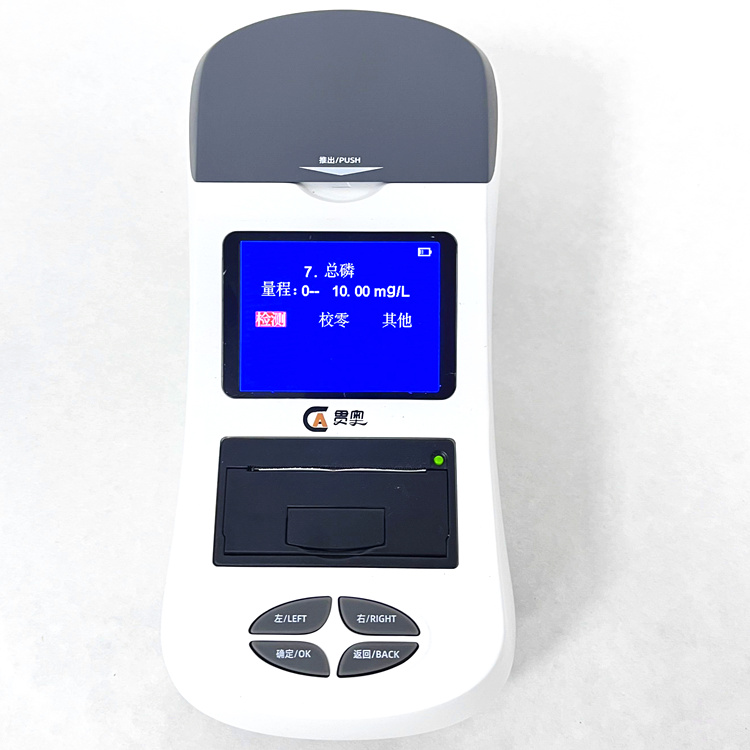Total phosphorus is an important water quality indicator used to evaluate the nutritional status and pollution level in water bodies. There are two commonly used methods for detecting total phosphorus content in water: a total phosphorus analyzer and a total phosphorus rapid test paper. Today, we will talk about the differences between them?
The difference between total phosphorus analyzer and total phosphorus rapid testing paper
1. Detection principle: The total phosphorus analyzer in water uses complex chemical analysis methods to measure the concentration of total phosphorus in water samples. It is usually based on such technologies as spectrophotometry, Atomic absorption spectroscopy or chemiluminescence. These instruments require specialized equipment and operational skills to accurately measure samples. The rapid test paper for total phosphorus is a simple testing method based on the principle of chemical reaction. There are specific reagents on the test paper, and after reacting with total phosphorus in the water sample, the test paper will change color to indicate the presence of total phosphorus.
2. Precision and accuracy: Total phosphorus analyzers in water typically provide higher precision and accuracy, which can measure more accurate total phosphorus concentration values. After calibration and standardization, these instruments can eliminate Confounding and provide reliable results. However, rapid testing paper for total phosphorus usually has low accuracy and precision, and the results may be relatively rough and susceptible to interference from other factors.
3. Convenience of use: The total phosphorus rapid testing paper is more convenient and easy to operate compared to the total phosphorus analyzer in water. Simply immerse the test paper in the water sample, and after the test paper reaction is completed, the concentration range of total phosphorus can be estimated by comparing the color change of the test paper with the color on the standard colorimetric card. The total phosphorus analyzer in water requires specialized equipment and complex operating procedures, usually used in a laboratory environment.
4. Application scope: Due to the high accuracy and sensitivity of the total phosphorus analyzer in water, it is suitable for application scenarios with high requirements for total phosphorus concentration, such as environmental monitoring, water quality assessment, scientific research, etc. The total phosphorus rapid testing paper is mainly used for daily water quality testing and preliminary screening, and is suitable for quickly obtaining the relative concentration information of total phosphorus.

Advantages of total phosphorus analyzer:
High precision and accuracy: The total phosphorus analyzer in water uses professional analysis methods and instruments, which can provide high precision and accuracy, and is suitable for application scenarios with high requirements for total phosphorus concentration.
Multifunctionality: The total phosphorus analyzer in water usually has multiple analytical functions, which can perform more complex water quality analysis, not limited to the detection of total phosphorus.
Reliability: After calibration and standardization, the total phosphorus analyzer in water provides reliable results, eliminating many possible Confounding.
Disadvantages of total phosphorus analyzer:
High cost and equipment requirements: Total phosphorus analyzers in water are usually expensive and may require significant investment for general users.
Complex operation: The total phosphorus analyzer in water requires operation training, and the operation process is relatively complex, requiring certain requirements for operators.
Advantages of rapid testing paper for total phosphorus:
Easy to use: The total phosphorus rapid test paper is easy to use, simply immerse the test paper in the water sample and determine the total phosphorus content through colorimetric results, without the need for complex operations and equipment.
Portability: The total phosphorus rapid testing paper is compact and lightweight, and can be used anytime and anywhere, suitable for outdoor places and temporary sampling.
Low cost: The total phosphorus rapid testing paper is cheaper compared to the total phosphorus analyzer in water, making it more cost-effective for general users.
Disadvantages of rapid testing paper for total phosphorus:
Limited accuracy: The accuracy of the rapid testing paper for total phosphorus is relatively low, and the results may be relatively rough and susceptible to interference from other factors.
Concentration limitation: Rapid testing paper for total phosphorus usually only provides a relative concentration range of total phosphorus and cannot provide specific concentration values.
Only applicable for preliminary screening: The total phosphorus rapid test paper is suitable for daily water quality testing and preliminary screening, and cannot meet the requirements of more accurate total phosphorus concentration detection.
Overall, the total phosphorus analyzer is suitable for applications that require high total phosphorus concentration and accurate results, but it is expensive and complex to operate. The rapid testing paper for total phosphorus is convenient and economical, suitable for rapid field testing and preliminary screening, but its accuracy is limited. Choosing which method to use should be evaluated based on specific needs, budget, and available resources.



